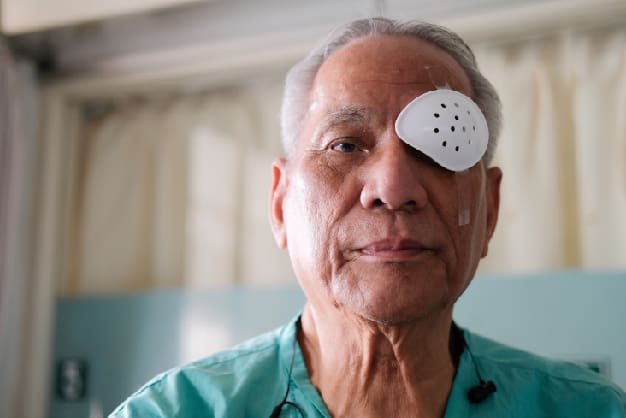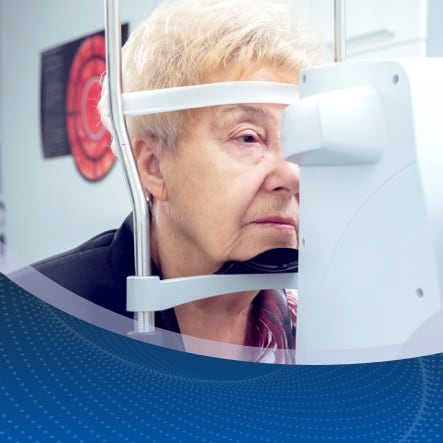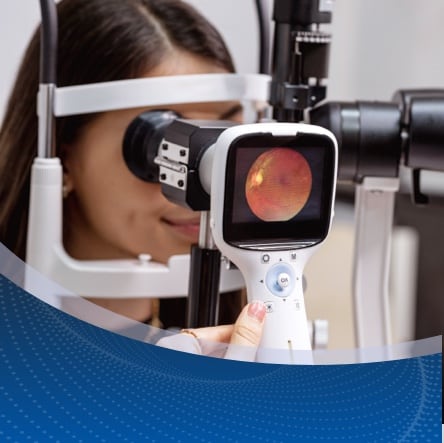Cataract surgery can be a life-changing procedure that restores clear vision and improves quality of life. However, one of the patients’ most common concerns is about recovery. How long do you need to rest after cataract surgery? How long do you need to wear an eye shield at night after cataract surgery? What kind of care will your eyes require during the cataract surgery recovery time? These are some of the many questions licensed ophthalmologists can easily answer for you.
Though you will start to see results within the first few days post-procedure, a full cataract surgery recovery typically takes about eight weeks. Follow the timeline below to get a full picture of what the average recovery period may look like for you.
Not sure if you need cataract surgery? Read our blog to recognize the seven signs!
Going Home After Surgery
After your cataract surgery, you can most likely go home the same day. Arrange for a friend or family member to drive you, as you won’t be able to drive yourself. You might feel a bit groggy or disoriented initially, which is completely normal during the cataract surgery recovery time.
Once home, you’ll likely be tired and may want to nap. Before that, remember to wear the eye shield provided by your surgeon to protect your eye while you sleep. This shield may be removed the next day, but always follow your surgeon’s specific instructions.
Cataract Surgery Recovery Timeline: What to Expect
A cataract surgery recovery generally takes around eight weeks. Here is a week-by-week timeline of what you can expect during recovery:
| Recovery Stage | What to Expect |
| First 24 Hours | Blurry vision, mild discomfort, and sensitivity to light are normal. You will wear an eye shield to protect your eyes. |
| 1 Week | Vision begins to stabilize, and any mild irritation should fade. Avoid heavy lifting or bending over during this time. |
| 2–4 Weeks | Most of the healing is complete. Light activities are typically allowed, but still avoid swimming or strenuous exercise. |
| 6–8 Weeks | Full vision clarity is usually achieved. If needed, a new glasses prescription may be given at this point. |
Immediate Post-Surgery Sensations
After cataract surgery, be aware of and manage the sensations you might experience. Please note the following tips to help ease your recovery:
- Grittiness: Feeling like there is sand in your eye is common and typically improves within a few days.
- Watering: Increased tearing is a normal response and should diminish soon.
- Blurred Vision: Temporary blurry vision is expected due to swelling and will gradually clear up.
- Double Vision: This might occur initially and generally resolves as your eye heals.
- Red or Bloodshot Eye: This is due to minor bleeding or irritation and usually fades within a few weeks.
Feeling and some visual function should return within a few hours post-surgery. However, full vision clarity may take a few days. If you need new glasses, you will be advised to wait until your eye has fully healed, generally after six weeks.
Cataract surgery has a 95% success rate in improving visual acuity. Once recovered, you should be able to resume normal activities, including driving. If you experience increased pain, redness, or decreased vision, contact your eye surgery department immediately.
When to Contact Your Doctor Immediately
While mild discomfort is expected after surgery, contact your Ophthalmologist right away if you experience:
- Severe pain or increasing redness in the operated eye (instead of gradual improvement).
- Sudden loss of vision or a significant increase in blurriness.
- Flashes of light, a surge of new floaters, or a dark “curtain” in your vision (possible signs of retinal detachment).
- Persistent nausea or a headache that doesn’t go away (could indicate high eye pressure).
Tip: Your surgeon should provide a 24-hour contact number for any urgent post-surgery concerns. Don’t hesitate to call if something doesn’t feel right.
Dos and Don’ts for Recovery
Do:
- Rest for 2–3 days after surgery
- Take painkillers if necessary
- Use an eye shield at bedtime for at least 7 days
- Use prescribed eye drops
- Continue taking regular medications
- Bathe and shower with caution
- Wear an eye shield or sunglasses outside
- Engage in light activities
- Attend follow-up appointments with your eye doctor
- Be sure to understand your eye drop regimen
Don’t:
- Rub or touch your eye
- Get soap or shampoo in your eye
- Swim for 4–6 weeks
- Engage in strenuous activity
- Wear eye makeup for 4 weeks
- Travel by air without consultation
- Drive without approval
How To Use Your Eye Drops
After the procedure, you will receive prescribed eye drops from your doctor. Follow these steps to ensure you administer the drops correctly during your cataract surgery recovery time:
- Wash Your Hands: Always start by washing your hands thoroughly to avoid introducing any bacteria to your eyes.
- Prepare Your Eye Drops: If instructed, shake the bottle gently. Uncap the bottle so the dropper does not touch any surfaces.
- Tilt Your Head Back: Sit or lie down with your head tilted backward. A mirror could help guide you through the process.
- Pull Down Lower Eyelid: With one hand, gently pull down your lower eyelid to create a small pocket.
- Administer the Drop: Hold the bottle tip over your eye without touching it. Squeeze one drop into the pocket formed by your lower eyelid.
- Close Your Eye: Close your eye for a minute or two to allow the medicine to be absorbed. Avoid blinking or squeezing your eye.
- Blot Excess Drops: Use a clean tissue to gently blot away any excess liquid around your eye, but do not rub your eye.
- Repeat if Needed: If you miss and feel that the drop did not reach your eye, it’s safe to administer another drop without worrying about overdosing.
- Cap the Bottle: Always replace the bottle cap immediately after use to prevent contamination.
- Follow Schedule: Adhere to your prescribed schedule, which may include several times a day, as indicated by your doctor.
For official cataract surgery recovery guidelines, you can visit the American Academy of Ophthalmology (AAO) website for more detailed information on what to expect. Want to learn more about insurance coverage for cataract procedures? Read our related article: Does Medicare Cover Cataract Surgery?
Ready to Restore Your Vision? Book Your Cataract Surgery Consultation Today!
Schedule your appointment online or call 1-888-873-9348 to speak with our eye care specialists. Visit us at Griffey Eye Care & Laser Center, trusted for expert cataract treatment.
Please note that the suggestions provided in this blog are for general informational purposes only and may not be suitable for your specific insurance plan and cataract needs. It is important to consult a qualified healthcare professional for personalized advice and treatment.













